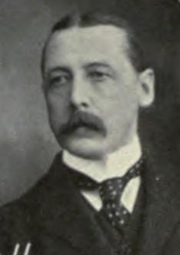Edbert Ansgar Hewett
|
Edbert Ansgar Hewett CMG |
|
|---|---|
 |
|
| Unofficial Member of the Executive Council of Hong Kong | |
|
In office 1 June 1906 – 24 November 1915 |
|
| Appointed by | Sir Matthew Nathan Sir Frederick Lugard |
| Preceded by | C. W. Dickson |
| Succeeded by | E. H. Sharp |
| Unofficial Member of the Legislative Council of Hong Kong | |
|
In office 17 May 1906 – 28 October 1915 |
|
| Appointed by | Sir Matthew Nathan |
| Preceded by | R. G. Shewan |
| Succeeded by | P. H. Holyoak |
| Chairman of the Shanghai Municipal Council | |
|
In office January 1900 – 25 January 1901 |
|
| Preceded by | Frederick Anderson |
| Succeeded by | John Prentice |
| Personal details | |
| Born |
5 September 1860 England |
| Died | 24 November 1915 (aged 55) British Hong Kong |
| Resting place | Protestant cemetery |
| Spouse(s) | Ruth Jeannette, née McKendrick |
| Occupation | Businessman |
Edbert Ansgar Hewett, CMG (5 September 1860 – 24 November 1915) was a prominent British merchant in Hong Kong and China and member of the Executive Council and Legislative Council of Hong Kong.
Hewett was born on 5 September 1860, second son of the Sir George John Routledge Hewett, 3rd Baronet., descent of Sir George Hewett, 1st Baronet, and Clara von Pochammer. On 2 February 1893 he married Ruth Jeannette McKendrick, daughter of Quentin K. McKendrick of New York.
He was educated mainly by private tutors. At the age of seventeen he joined the Peninsular and Oriental Steam Navigation Company at their head office in London. He arrived in Hong Kong in 1880 and acted as agent for the company in Shanghai for seven-year, in Yokohama for two years, and in Kobe for six months. He became the Superintendent of P&O Co. Hong Kong branch, responsible for the whole traffic in the Far East from Yokohama to Penang.
Hewett was the member of the Shanghai Municipal Council from 1897 to 1901 and served as chairman in 1900 to 1901. During the Boxer Rebellion he was active in preparations for the defence of the Settlement when the naval fleet sailed to Peking leaving about 12,000 white population and nearly half a million Chinese under his charge. As civil commandant of the volunteers he enrolled all able-bodied men and had a force of nearly 1,200 whites under arms. He also organised the first company of Japanese volunteers that had ever been raised outside Japan. The highest encomiums were passed upon him by both the naval and military authorities.
He took great interest of conservancy of the Huangpu River throughout his residence in Shanghai. He was on the committee of the Shanghai Chamber of Commerce and represented the chamber at Peking in 1901 to urge for the Shanghai river conservancy as dealt with in after the Boxer Rebellion. A special committee consisting of the English, German, American, French and Dutch ministers was formed as a result and adopted Hewett's proposals as the chamber's representative which were embodied in the protocol.
...
Wikipedia
